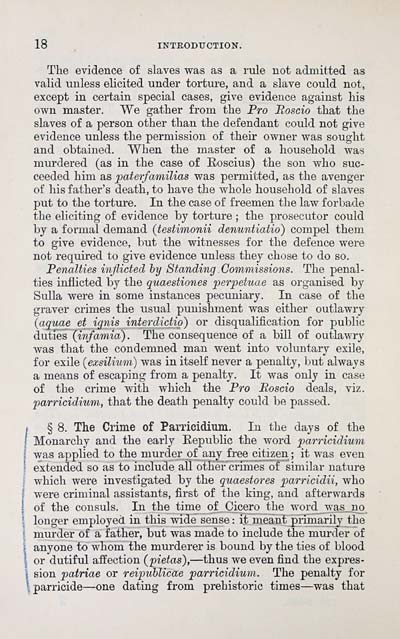Download files
Complete book:
Individual page:
Thumbnail gallery: Grid view | List view

18 INTRODTTCTION.
The evidence of slaves was as a rule uot admitted as
valid unless elicited under torture, and a slave could not,
except in certain special cases, give evidence against liis
own master. We gatlier from tlie Pro Boscio tliat the
slaves of a person other than the defendant could not give
evidence unless the permission of their owner was sought
and obtained. When the master of a household was
murdered (as in the case of Eoscius) the son who suc-
ceeded him as paterfamilias was permitted, as the avenger
of his father's death, to have the whole household of slaves
put to the torture. In the case of freemen the law forbade
the eliciting of evidence by torture ; the prosecutor could
by a formal demand (testimonii denuntiatio) compel them
to give evideuce, but the witnesses for the defence were
not required to give evidence unless they chose to do so.
PenaUies inflicted hy Standing Commissions. The penal-
ties inflicted by the quaestiones perjpetuae as organised by
Sulla were in some instances pecuniary. In case of the
graver crimes the usual punishment was either outlawry
{aquae et ignis interdictio) or disqualification for pubhc
duties (infamia) . The consequence of a bill of outlawry
was tliat the condemued man went into voluntary exile,
for exile (exsilium) was in itself never a penalty, but always
a means of escaping from a penalty. It was only in case
of the crime with which the Pro Eoscio deals, viz.
parricidium, that the death penalty could be passed.
§ 8. The Crime of Parricidium. In the days of the
Monarchy and the early EepubUc the word pa?Ttci(?wm
was applied to the murder of any f ree citizen ; it was even
extended so as to include all other crimes of similar nature
which were investigated by the quaestores imrricidii, who
were criminal assistants, first of the king, and afterwards
of the consuls. In the time of Cicero the word was^jao
louger employed in this wide sense : it meant primarily the
mui'der of a father, but was made to include the murder of
anyone to whom the murderer is bound by the ties of blood
or dutiful affection (pietas), — thus we even find the expres-
sion patriae or reipuhlicae parricidium. The penalty for
■ parricide — one dating from prehistoric times — was that
The evidence of slaves was as a rule uot admitted as
valid unless elicited under torture, and a slave could not,
except in certain special cases, give evidence against liis
own master. We gatlier from tlie Pro Boscio tliat the
slaves of a person other than the defendant could not give
evidence unless the permission of their owner was sought
and obtained. When the master of a household was
murdered (as in the case of Eoscius) the son who suc-
ceeded him as paterfamilias was permitted, as the avenger
of his father's death, to have the whole household of slaves
put to the torture. In the case of freemen the law forbade
the eliciting of evidence by torture ; the prosecutor could
by a formal demand (testimonii denuntiatio) compel them
to give evideuce, but the witnesses for the defence were
not required to give evidence unless they chose to do so.
PenaUies inflicted hy Standing Commissions. The penal-
ties inflicted by the quaestiones perjpetuae as organised by
Sulla were in some instances pecuniary. In case of the
graver crimes the usual punishment was either outlawry
{aquae et ignis interdictio) or disqualification for pubhc
duties (infamia) . The consequence of a bill of outlawry
was tliat the condemued man went into voluntary exile,
for exile (exsilium) was in itself never a penalty, but always
a means of escaping from a penalty. It was only in case
of the crime with which the Pro Eoscio deals, viz.
parricidium, that the death penalty could be passed.
§ 8. The Crime of Parricidium. In the days of the
Monarchy and the early EepubUc the word pa?Ttci(?wm
was applied to the murder of any f ree citizen ; it was even
extended so as to include all other crimes of similar nature
which were investigated by the quaestores imrricidii, who
were criminal assistants, first of the king, and afterwards
of the consuls. In the time of Cicero the word was^jao
louger employed in this wide sense : it meant primarily the
mui'der of a father, but was made to include the murder of
anyone to whom the murderer is bound by the ties of blood
or dutiful affection (pietas), — thus we even find the expres-
sion patriae or reipuhlicae parricidium. The penalty for
■ parricide — one dating from prehistoric times — was that
Set display mode to: Large image | Transcription
Images and transcriptions on this page, including medium image downloads, may be used under the Creative Commons Attribution 4.0 International Licence unless otherwise stated. ![]()
| Early Gaelic Book Collections > Matheson Collection > Pro S. Roscio Amerino > (26) |
|---|
| Permanent URL | https://digital.nls.uk/76502618 |
|---|
| Description | Items from a collection of 170 volumes relating to Gaelic matters. Mainly philological works in the Celtic and some non-Celtic languages. Some books extensively annotated by Angus Matheson, the first Professor of Celtic at Glasgow University. |
|---|
| Description | Selected items from five 'Special and Named Printed Collections'. Includes books in Gaelic and other Celtic languages, works about the Gaels, their languages, literature, culture and history. |
|---|

